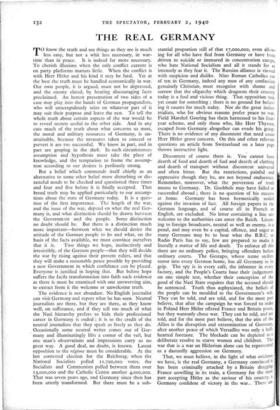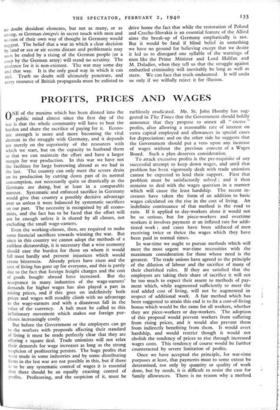THE REAL GERMANY
TO know the truth and see things as they are is much less easy, but not a whit less necessary, in war- time than in peace. It is indeed far more necessary. To cherish illusions when the only conflict current is on party platforms matters little. When the conflict is with Herr Hitler and his kind it may be fatal. Yet at the best the truth must be handled economically in war. Our own people, it is argued, must not be depressed, and the enemy elated, by hearing discouraging facts proclaimed. An honest presentation of two sides of a case may play into the hands of German propagandists, who will unscrupulously seize on whatever part of it may suit their purpose and leave the rest. To tell the whole truth about certain aspects of the war would be to reveal secrets useful to the other side. And in any case much of the truth about what concerns us most, the moral and military resources of Germany, is un- attainable, because the measures taken to conceal or pervert it are too successful. We know in part, and in part are groping in the dark. In such circumstances assumption and hypothesis must take the place of knowledge, and the temptation to frame the assump- tion according to our desires is perilously strong.
But a belief which commends itself chiefly as an alternative to some other belief more disturbing or dis- tasteful needs to be checked and questioned three times and four and five before it is finally accepted. That broad truth may be applied particularly to our assump- tions about the state of Germany today. It is a ques- tion of the first importance. The length of the war, and the issue of the war, depend on what the real Ger- many is, and what distinction should be drawn between the Government and the people. Some distinction no doubt should be. But there is a distinction much more important—between what we should desire the attitude of the German people to be and what, on the basis of the facts available, we must convince ourselves that it is. Two things we hope, instinctively and irresistibly, of the German people—that they will decide the war by rising against their present rulers, and that they will make a reasonable peace possible by providing a new Government in which confidence can be placed. Everyone is justified in hoping that. But before hope suffers the facile transformation into faith such evidence as there is must be examined with one unswerving am, to extract from it the welcome or unwelcome truth.
The evidence is not abundant. No English journalist can visit Germany and report what he has seen. Neutral journalists are there, but they are there, as they know well, on sufferance, and if they tell too much of what the Nazi hierarchy prefers to hide their professional career in Germany is ended ; it is to the credit of the neutral journalists that they speak as freely as they do. Occasionally some neutral writer comes out of Ger- many and illuminatingly lifts a corner of the veil, but one man's observations and impressions carry us no great way. A good deal, no doubt, is known. Latent opposition to the regime must be considerable. At the last contested election for the Reichstag, when the National Socialists polled 11,700,000 votes, the Socialists and Communists polled between them over 13,000,000 and the Catholic Centre another 4,000,000. That was seven years ago, and Germany since then has been utterly transformed. But there must be a sub-
stantial proportion still of that 17,000,000, even allow. ing for all who have fled from Germany or have been driven to suicide or immured in concentration camps, who hate National Socialism and all it stands for as intensely as they fear it. The Russian alliance is viewed with suspicion and dislike. Nine Roman Catholics out of ten in Germany, indeed any man of any confession genuinely Christian, must recognise with shame and sorrow that the oligarchy which dragoons their country today is a foul and vicious thing. That opposition may yet count for something ; there is no ground for believ- ing it counts for much today. Nor do the great indus- trialists, who for obvious reasons prefer peace to war. Field Marshal Goering has them harnessed to his four- year scheme, and only those who, like Herr Thyssen, escaped from Germany altogether can evade his grasp.
There is no evidence of any discontent that need cause Herr Hitler grave concern. On this and other relevant questions an article from Switzerland on a later page throws instructive light.
Discontent of course there is. You cannot have dearth of food and dearth of fuel and dearth of clothing and dearth of transport without discontent universal and often bitter. But the restrictions, painful and oppressive though they be, are not beyond endurance. Remember, moreover, what the perversion of truth means to Germany. Dr. Goebbels may have failed or succeeded abroad ; there is no question of his success at home. Germany has been hermetically sealed against the invasion of fact. All foreign papers in the German language, and of course all in French or English, are excluded. No letter containing a line un- welcome to the authorities can enter the Reich. Listen- ing to foreign broadcasts, neutral as well as enemy, is a penal, and may even be a capital, offence, and eager as many Germans may be to hear what the B.B.C. or Radio Paris has to say, few are prepared to make it literally a matter of life and death. To enforce all this there are no ordinary police, bringing offenders before ordinary courts. The Gestapo, whose name strikes terror into every German home, has all Germany in its grip. The spy is in every café, the informer in every factory, and the People's Courts base their judgements on one simple test, whether their conception of the good of the Nazi State requires that the accused should be sentenced. Truth thus asphyxiated, the beliefs of the people can be moulded to the Government's will. They can be told, and are told, and for the most parr believe, that after the campaign he was forced to make in Poland Herr Hitler offered France and Britain peace, but they wantonly chose war. They cart be told, and are told, and for the most part believe, that the aim of the Allies is the disruption and extermination of GermanY, after another peace of which Versailles was only a half- hearted foretaste. The blockade can be depicted as a deliberate resolve to starve women and children. The war that is a war on Hitlerism alone can be represented as a dastardly aggression on Germany.
That, we must believe, in the light of what evidence we have, is the real Germany, a Germany convinced it has been criminally attacked by a Britain dragging France unwilling in its train, a Germany for the most part accepting Hitler as the saviour of his countrh a Germany confident of victory in the war.... There are no doubt dissident elements, but not as many, or as strong, as German émigrés in secret touch with men and women of their own way of thought in Germany would suggest. The belief that a war in which a clear decision by land or sea or air seems distant and problematic may soon be ended by a rising of the German people (or a coup by the German army) will stand no scrutiny. The evidence for it is non-existent. The war may some day end that way. It is the only good way in which it can end. Truth no doubt will ultimately penetrate, and every resource of British propaganda must be enlisted to drive home the fact that while the restoration of Poland and Czecho-Slovakia is an essential feature of the Allied aims the break-up of Germany emphatically is not. But it would be fatal if blind belief in something we have no ground for believing except that we desire it led us to disregard one syllable of the warnings of men like the Prime Minister and Lord Halifax and M. Daladier, when they tell us that the struggle against embattled criminality will inevitably be long as well as stern. We can face that truth undaunted. It will undo us only if we wilfully reject it for illusion.







































 Previous page
Previous page